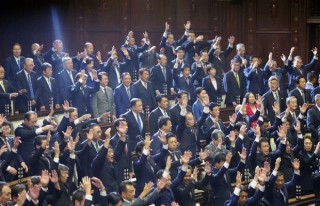Loading
Search
▼ Japan PM Ishiba Dissolves Lower House For Oct. 27 Election
- Category:Event
Prime Minister Shigeru Ishiba dissolved Japan's House of Representatives on Wednesday, setting the stage for an Oct. 27 general election to seek a vote of confidence before putting his leadership in reforming his scandal-tainted ruling party to the real test.
The dissolution of the 465-member lower house came just eight days after Ishiba took office, making it the fastest in postwar Japan. He fended off last-ditch efforts by the opposition to derail what they saw as his hasty move by submitting a no-confidence motion against the Cabinet.
Official campaigning is set to begin on Oct. 15 for the first lower house election since 2021. The focus is on whether the Liberal Democratic Party, headed by Ishiba, can retain its majority in the more powerful chamber, political analysts said.
As lower house speaker Fukushiro Nukaga announced the dissolution, chamber members stood up and shouted "banzai," a customary way of acknowledging their current term has come to an end, and they now face the uncertainty of the upcoming election.
"The objective of this election is to gain public approval of our efforts to fundamentally change the direction of Japanese society," Ishiba said at a press conference.
Ishiba acknowledged that the winds are blowing against the party, but he was confident the LDP together with its junior coalition partner Komeito would win a majority of the 465 seats up for grabs in the forthcoming election.
The coalition held more than 280 seats -- around 250 for the LDP and about 30 for Komeito, well above the majority threshold of 233. The main opposition Constitutional Democratic Party of Japan, meanwhile, held nearly 100 seats.
In a one-on-one debate in parliament that preceded the dissolution, CDPJ chief Yoshihiko Noda lashed out at Ishiba for trying to deflect voter attention from the issue of "secret money," referring to revelations that LDP members had failed to report political funds properly.
"You are dissolving the house early," thinking that the LDP "can secure a victory during the honeymoon period," when new leaders tend to enjoy an initial rise in public support, Noda, a former Japanese prime minister, told Ishiba.
Under Japan's Constitution, prime ministers have the authority to dissolve the chamber at their discretion.
During the campaign for the LDP leadership, Ishiba had said he would dissolve the lower house only after giving opposition lawmakers sufficient time to question him in parliament.
His decision to pursue dissolution, made known even before he assumed the premiership on Oct. 1, prompted a strong backlash from them, who viewed it as a disregard for the Constitution.
The CDPJ has been urging the government to draft an extra budget for the current fiscal year through next March to support recovery efforts in areas affected by an earthquake and heavy rain in central Japan.
After the LDP elected Ishiba, known as a lone wolf who was seen as an intraparty opposition force, the ruling party saw an increase in public support, according to a Kyodo News poll released earlier this month.
But the approval rate for his Cabinet, at around 50 percent, is not high, compared with his recent predecessors, underscoring the difficult task ahead for him to win over voters in the key election.
The LDP withdrew its official endorsements on Wednesday for 12 members implicated in the political funds scandal, with all but one of them from a now-disbanded intraparty faction led by the late Prime Minister Shinzo Abe, who once exerted significant influence over the party.
Voters want the government to prioritize steps to support the economy as Japanese households are still struggling to cope with rising prices of everyday goods. When the effect of inflation is taken into account, many have yet to feel the benefits of recent pay hikes and the government plans to draw up fresh relief measures in the coming weeks.
The CDPJ is aiming to siphon off LDP support among moderate conservatives who are frustrated with the ruling party's handling of the scandal and eventually bring about a change of government.
Still, a fractious opposition bloc would give a boost to the ruling parties, according to the analysts. The prospects of the opposition parties joining forces, possibly by unifying candidates to avoid splitting the vote, look dim with little time to prepare.
For Ishiba's desire for parliament to initiate a proposal to revise the Constitution, it needs to secure support from two thirds of the chamber as well as the House of Councillors.
- October 9, 2024
- Comment (0)
- Trackback(0)


